Key takeaways:
- Ethical business practices focus on aligning values with actions, enhancing trust and relationships within the community.
- Prioritizing ethics in the cannabis industry combats stigma and establishes legitimacy, boosting customer loyalty and compliance with regulations.
- Building trust involves transparency about sourcing, product quality, and actively seeking customer feedback, fostering genuine connections.
- Community engagement and social responsibility are vital, with businesses contributing to local initiatives to enhance well-being and strengthen ties.
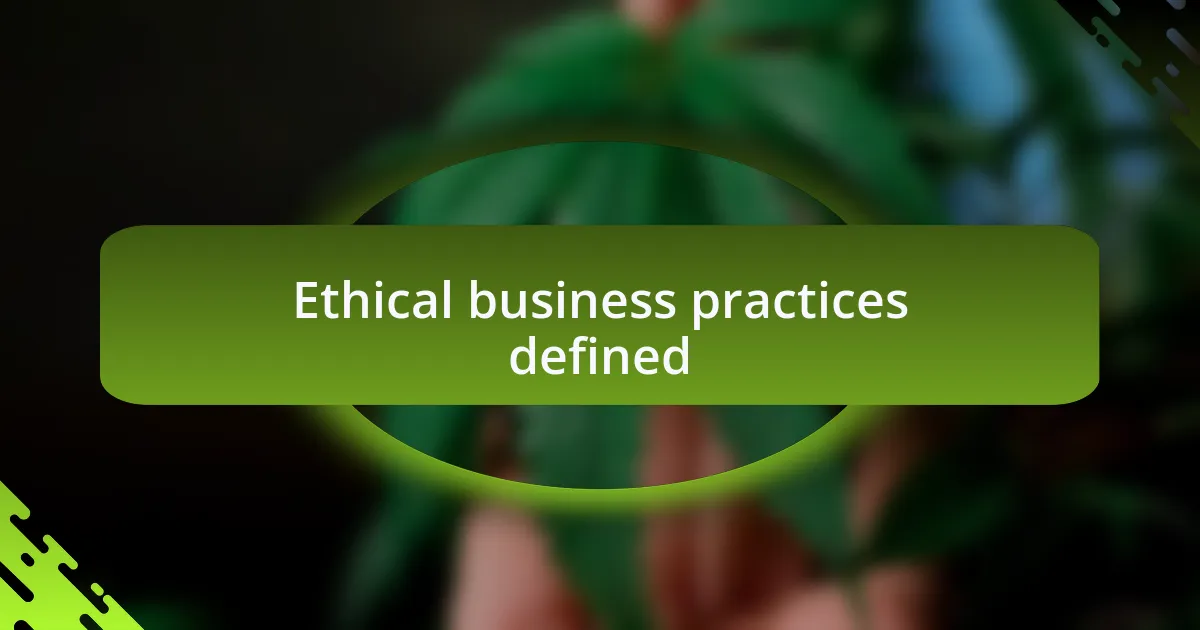
Ethical business practices defined
Ethical business practices refer to the principles that guide organizations in making decisions that are morally sound and socially responsible. For me, this goes beyond simply following the law; it’s about aligning my values with my actions. Have you ever felt that pang of uncertainty when faced with a tricky decision? I know I have, and it’s in those moments that ethics truly come into play.
I remember a time when I had to choose between a lucrative deal and one that prioritized sustainability. The pressure was intense. Ultimately, I chose the latter, reinforcing my belief that ethical practices build stronger, more trusting relationships—both with customers and within the community. This aspect of integrity isn’t just theoretical; it has tangible effects that can steer the course of a business.
Engaging in ethical business practices often means considering the broader impact of our actions. It’s thrilling to think how a commitment to fairness, transparency, and respect can not only enhance a brand’s reputation but also create real change in the world. Does that resonate with you? I’ve found that when I commit to these values, my business thrives, both financially and morally.

Importance of ethics in cannabis
Ethics in the cannabis industry is crucial since we’re operating in a landscape that’s still finding its footing. I recall a local dispensary that decided to source its products from sustainable farms only. The owner shared how much more fulfilling it was to see customers appreciate the care behind the products. Isn’t it fascinating how ethics can not only create loyalty but also drive demand for quality? This commitment to ethical sourcing positioned that business as a leader in the community.
When we prioritize ethics, we also help to combat the stigma surrounding cannabis. I remember chatting with a passionate advocate who emphasized that our integrity can alter public perception. By adopting ethical practices and being transparent about our processes, we bring legitimacy to our industry. Don’t you agree? Establishing trust through ethical behavior shows that we’re here for the long run, not just for profit.
Moreover, ethical practices can safeguard against legal ramifications that plague an industry still navigating regulatory waters. I’ve witnessed businesses crumble due to a lack of ethical foresight. Maintaining integrity not only protects our reputation but also ensures compliance with evolving laws. Why risk your hard-earned progress for short-term gains when integrity can provide lasting success? It’s a lesson I’ve learned over time, and it’s one that continues to shape my approach in the cannabis sector.
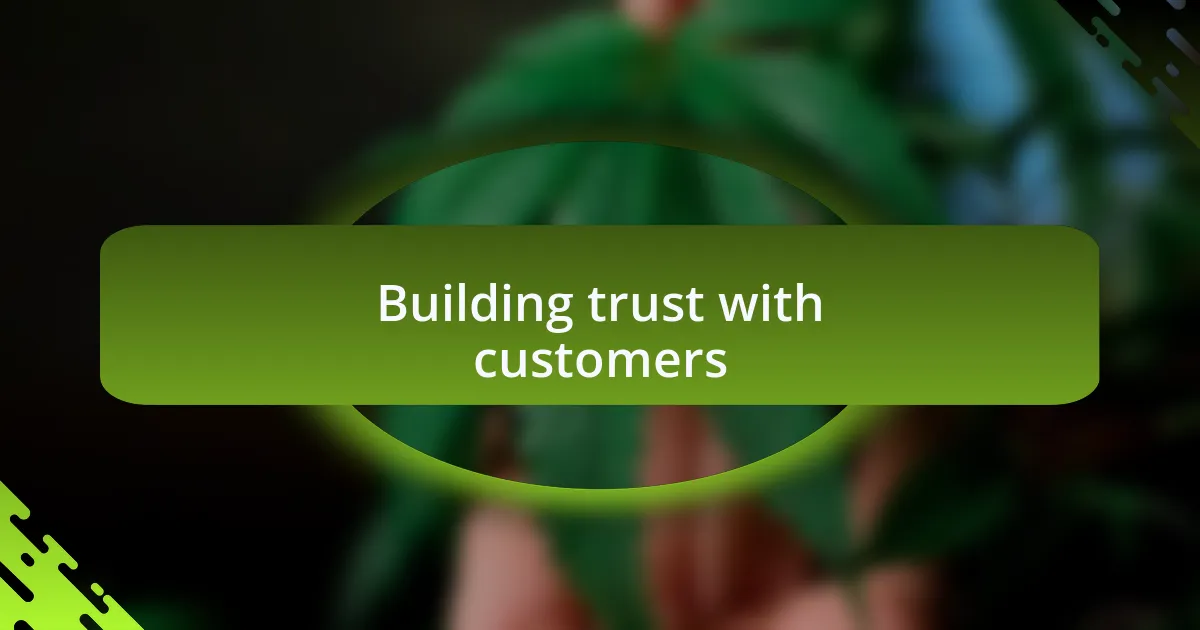
Building trust with customers
Building trust with customers goes beyond just providing quality products; it’s about fostering genuine relationships. I once hosted an open house at my dispensary, inviting community members to tour our facilities and meet the team. Seeing customers interact with us face-to-face created an atmosphere of openness that made them feel valued and respected. Have you ever noticed how a simple handshake can forge a connection that exceeds any marketing strategy?
Transparency is another crucial factor in building trust. I always make it a point to openly discuss our sourcing practices, product testing, and even our pricing structures. Sharing this information not only demystifies the cannabis purchasing process but also empowers customers to make informed decisions. Isn’t it interesting how a commitment to being upfront can alleviate doubt and encourage loyalty?
Moreover, I actively seek feedback from my customers. Early on, I introduced a survey system to gauge their preferences and concerns. The insights I received were eye-opening, revealing areas for improvement I hadn’t considered. Listening to customers fosters community and demonstrates that their opinions matter. How often do we overlook the power of feedback in shaping our business practices?
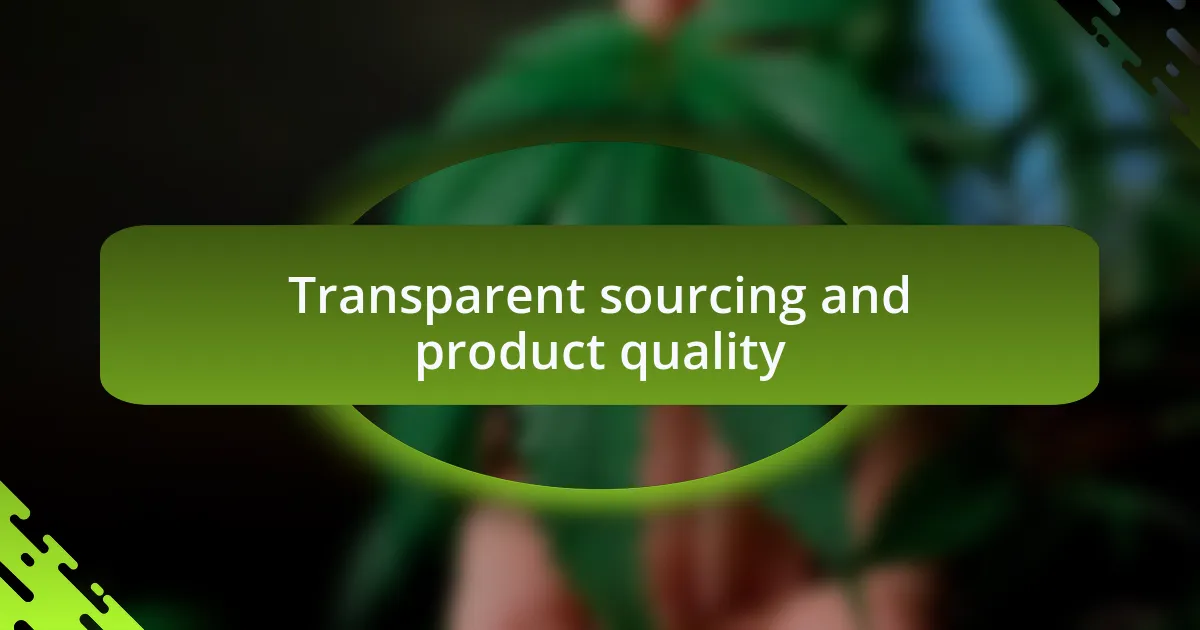
Transparent sourcing and product quality
When it comes to transparent sourcing, I take great pride in knowing exactly where our products come from. I remember a time when I visited a local grower to understand their cultivation methods. I was genuinely impressed by their commitment to organic practices, and sharing that story with my customers allowed them to see the faces behind the products. Isn’t it refreshing to know that the cannabis you consume is nurtured with care and integrity?
Quality assurance is another cornerstone of our operations. Each batch of our products undergoes rigorous testing by accredited labs to ensure potency and safety. I recall one of my customers expressing skepticism about product labels and the actual contents. I explained our testing protocols and shared lab results, turning their doubt into confidence. Have you ever felt reassured by knowing that a business prioritizes your well-being?
In my experience, being transparent about sourcing and quality not only empowers consumers but also elevates the entire industry. I’ve noticed that when I share our stories of sustainable practices and quality checks, it prompts thoughtful discussions among customers. Isn’t it remarkable how fostering this dialogue can further elevate our community’s standards?
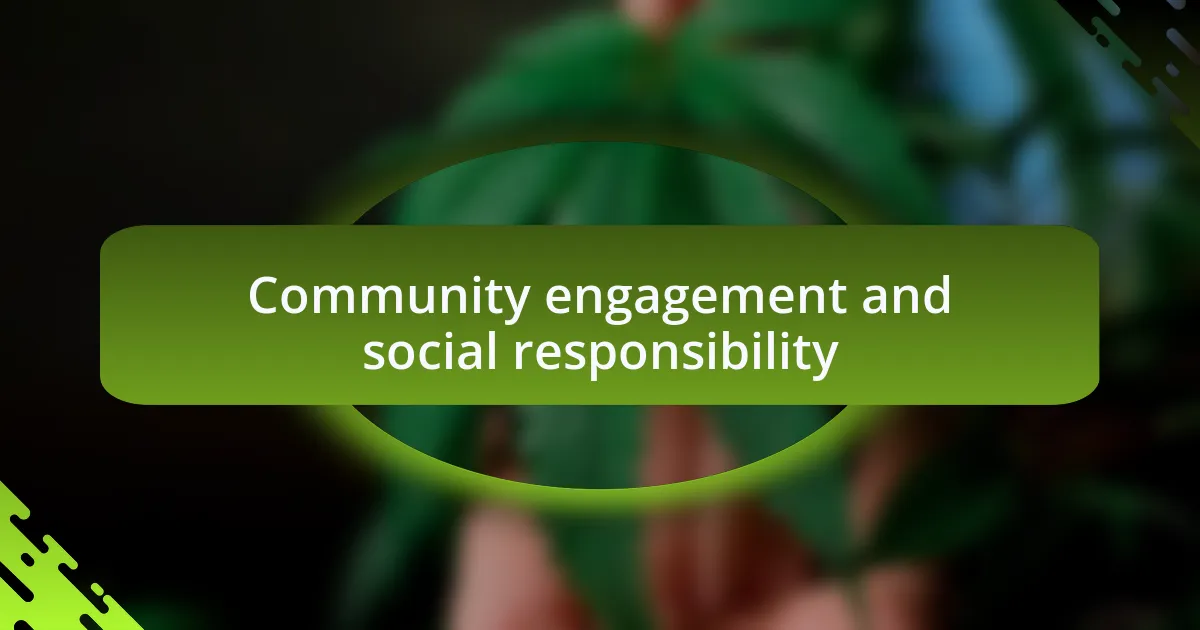
Community engagement and social responsibility
Engaging with the community is at the heart of ethical cannabis retailing. I remember organizing a local event where we invited families to learn about the benefits and responsible use of cannabis. The joy in their faces as they interacted with our knowledgeable staff was palpable. It made me realize how critical it is to bridge the gap between our industry and the community, fostering trust and understanding.
Social responsibility goes beyond product quality; it extends to supporting local initiatives that enhance community well-being. For instance, I partnered with a nearby nonprofit focused on mental health awareness, donating a portion of our profits to their campaigns. Seeing the impact of our contributions through their outreach made me proud. Have you ever felt a connection to a cause you believe in? It truly reinforces the notion that businesses have a role to play in making the world better.
Moreover, I’ve learned that encouraging customer feedback can cultivate a sense of belonging. One time, I introduced a suggestion box in-store, and the responses were eye-opening. Customers felt empowered to share their thoughts on how we could improve not just our business but also our community involvement. It reminded me that our clientele isn’t just consumers; they’re vital partners in fostering a socially responsible atmosphere. Isn’t that what sustainable business is all about?
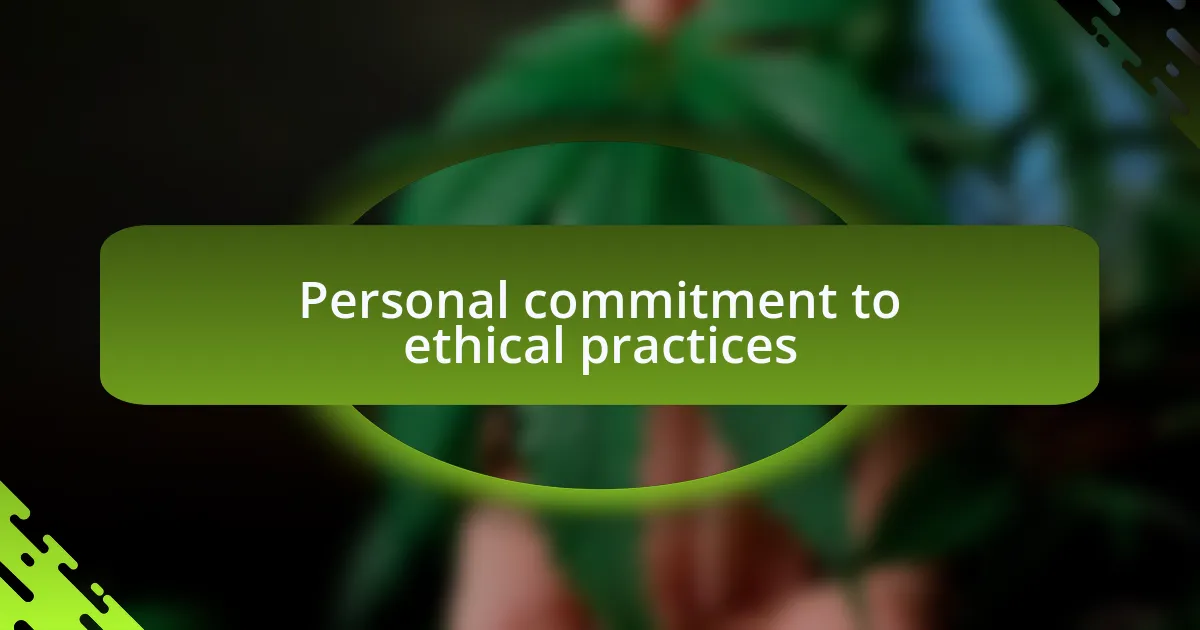
Personal commitment to ethical practices
I believe that personal commitment to ethical practices starts with self-reflection. When I made the decision to enter the cannabis industry, I knew I wanted to establish a store grounded in integrity. I remember sitting down one evening, pen in hand, writing down my core values. Each value acted as a guiding star, reminding me that transparency and honesty should be the bedrock of my business. Have you ever taken the time to evaluate what principles guide your choices? It’s a powerful exercise.
One vivid moment stands out in my journey. During a training session with my team, I shared a story about a previous business failure due to lack of ethical awareness. The faces in the room were serious, and I felt a shared understanding that ethical decision-making isn’t just theoretical; it’s personal. This built a culture where everyone felt responsible for upholding our values, knowing that our actions directly impact our customers and community. Isn’t it rewarding when everyone aligns with a common purpose?
When I think of my commitment to ethical practices, I often reflect on customer interactions. One day, a longtime patron came in and expressed concern over the sourcing of our products. Instead of brushing it off, I took her feedback seriously, diving deep into our supply chain transparency. This experience reinforced the importance of listening—true commitment means engaging with concerns, learning from them, and striving for improvement. How often do businesses really lean into feedback? It’s a necessary step that cultivates trust.